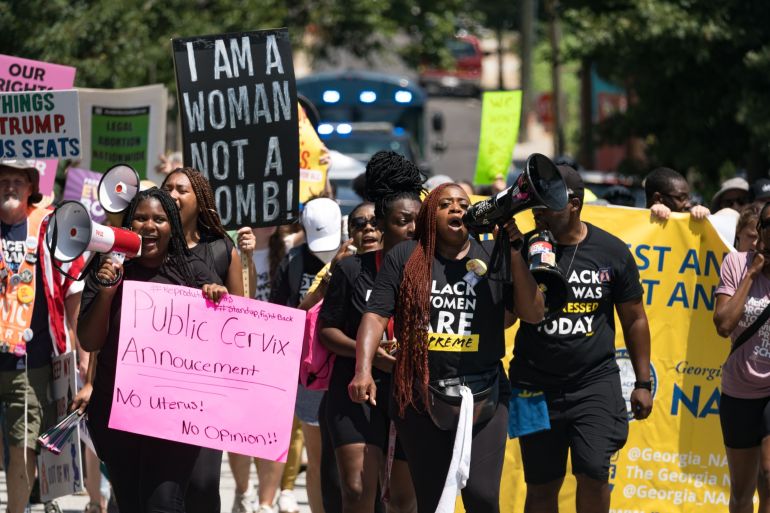Abortion ‘desert’ in US south is hurting Black women the most
![]()
Abortion ‘desert’ in US south is hurting Black women the most
Ten million Black women in the US face high barriers to abortion access, that will be difficult to overcome for many.

By Taylor Johnson and Kelsey ButlerBloomberg
Published On 23 Aug 202223 Aug 2022
In the weeks since the Supreme Court overturned Roe v. Wade, an abortion desert has ballooned in the US South, where bans are hitting Black women hardest.
Across the country Black patients have an abortion rate roughly four times that of their White peers, in part due to lower use of contraception that leads to higher rates of unintended pregnancies. In the states that have moved quickly to enact restrictions, Black women make up a far larger proportion of abortion seekers than in places where abortion remains legal.
KEEP READING
list of 4 itemslist 1 of 4
US: Kansas votes to protect abortion access in Roe v Wade test
list 2 of 4
US Justice Department sues Idaho over abortion ban
list 3 of 4
Kansas to vote on abortion in early test after Roe’s overturn
list 4 of 4
Georgia patients sent home after abortion ban comes into effect
end of list
In Mississippi, Black patients accounted for 74% of all abortions in 2019, far above the national average of 38%, according to the most recent data available from the Centers for Disease Control and Prevention. Now, the state has a total abortion ban, and its only clinic plans to relocate to New Mexico.
In neighboring states, where bans or extreme restrictions are proliferating, the figures tell a similar story. Georgia, Alabama, Tennessee and Arkansas — where Black women seek abortions more than any other demographic — have all enacted near or complete bans this year.
All told, abortion access is now in jeopardy for 10 million Black women of childbearing age across the US. Many of them live in the South, where Black women are statistically likely to experience higher poverty rates, have less health care coverage and more instances of pregnancy-related complications and death than their White counterparts. Some will have to travel hundreds of miles to seek care, a hurdle many won’t be able to overcome.
“We’ve been living in multiple Americas for a long time,” said Kwajelyn Jackson , the executive director at the Feminist Women’s Health Center in Atlanta, which serves mostly Black patients. “But what we’re seeing is another basic human right to health and wellbeing being so out of reach for so many.’’

Consider a hypothetical patient in Jackson, Mississippi—the location of the clinic at the center of the Supreme Court case overturning Roe. She would have to drive nearly 400 miles to access an abortion in Tallahassee, Florida, a multi-day trip that would require access to a car, money for gasoline, at least one night in a hotel, time off work and possibly child care to pull off.
“It’s a system of inequality, it’s a system of oppression,” said Michelle Colón, founder of Sisters Helping Every Woman Rise and Organize in Mississippi, an abortion-rights advocacy group focused on Black women in the South.
Texas, where a six-week ban went into effect last fall, gives some sense as to what happens when a state puts strict limits on abortions. Researchers found that a third of people don’t find out they’re pregnant until at or after the six-week mark, leaving those who want to terminate a pregnancy with no in-state options. After the law went into effect, around 1,400 Texans chose to seek care out of state each month — most headed to neighbors like New Mexico or Oklahoma, according to an analysis by the University of Texas at Austin. (Oklahoma now bans abortions, too.)































![Lieutenant-Colonel Robert Rogers (7 November 1731 – 18 May 1795) was a British Army officer and frontiersman. Born in Methuen, Massachusetts, he fought in King George’s War, the French and Indian War and the American Revolutionary War. During the French and Indian War, Rogers raised and commanded Rogers’ Rangers, a ranger unit trained for carrying out asymmetric warfare.[2][3](https://www.cowboyron.com/wp-content/uploads/2022/05/1262463_580743685323360_2133853937_o1-1-150x150.jpg)

















![Billie Joe Armstrong & Norah Jones – Silver Haired Daddy Of Mine [Music Video]](https://www.cowboyron.com/wp-content/uploads/2022/11/Al_St._John1-100x100.jpg)

























